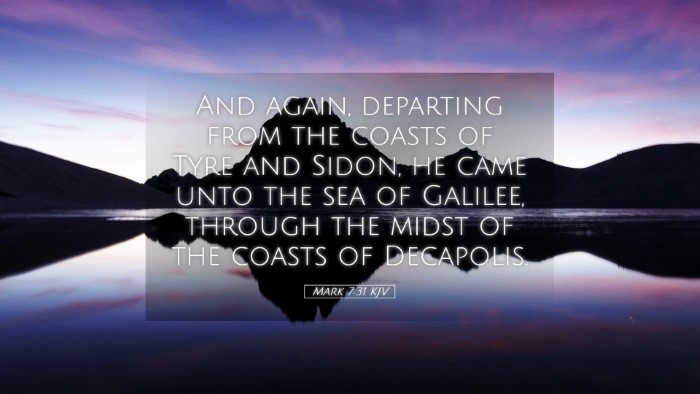Commentary on Mark 7:31
Bible Verse: "Again, departing from the region of Tyre and Sidon, He came through the midst of the region of Decapolis to the Sea of Galilee."
Contextual Overview
The journey of Jesus from Tyre and Sidon to Decapolis marks a significant moment in the Gospel of Mark, illustrating both the ministry of Christ to the Gentiles and His teaching to the Jewish audience. This verse captures Jesus' physical movement but also hints at deeper theological implications concerning His mission.
Insights from Public Domain Commentaries
1. Matthew Henry's Commentary
Matthew Henry highlights the profound implications of Jesus' travels. He notes that Jesus' departure from the region of Tyre and Sidon signifies a crucial aspect of His ministry – one that transcends geographical and cultural boundaries. Henry emphasizes the compassion of Christ towards those in the Decapolis, a predominantly Gentile area, suggesting this reflects God’s desire for all people to experience His mercy.
Henry writes about the geographical significance, pointing out that Tyre and Sidon were known for their paganism, and moving towards Decapolis underscores the importance of bringing the Gospel to the Gentiles. This highlights Jesus’ role as the Savior of all mankind, not limited by ethnicity or past belief systems.
2. Albert Barnes' Notes on the Bible
Albert Barnes elaborates on the geographical transition by examining the historical context of Decapolis. He explains that Decapolis was a league of ten cities predominantly populated by Gentiles. Barnes interprets this journey as a deliberate act of Jesus to reach out to non-Jews.
He further mentions that this movement illustrates God's inclination towards inclusivity in the New Covenant. Barnes emphasizes the physicality of Jesus' ministry as He moved from one region to another, reinforcing the idea that the Gospel is not confined to any particular community but is intended for all nations.
3. Adam Clarke's Commentary
Adam Clarke offers a detailed investigation of the locations mentioned in the verse. He examines the cultural implications of Jesus’ route, stressing the fact that the Decapolis was recognized for its Greek and Roman influence. Clarke points out that Jesus’ ministry in such regions serves as a testament of His authority and the universal nature of His message.
Clarke also makes a notable observation about the way Jesus engaged with the people of Decapolis, illustrating the effectiveness of His method in reaching diverse audiences. His interactions in this region are seen as foundational for the growing Gentile mission, foreshadowing the Great Commission where Jesus commands His followers to make disciples of all nations.
Theological Implications
This verse, while simple in its narrative, carries significant theological weight. It serves as a precursor to the fuller revelation of the Gospel’s reach beyond Israel. The movement from the specifically Jewish regions to the Gentile cities underscores the breaking of barriers that existed in the religious landscape of the time.
Universal Salvation: The journey signifies a turning point in salvation history, where Jesus opens the door for all humanity to receive God’s grace. It indicates that God's plan includes all people, reconciling both Jew and Gentile.
Application for Ministry
For pastors, students, and theologians, Mark 7:31 is a reminder of the inclusive nature of the Gospel. It challenges us to examine our own ministry and outreach efforts. Are we reaching out effectively to those outside our immediate community? How can we imitate Christ’s model of breaking cultural and social barriers to spread the message of hope?
Conclusion
In conclusion, Mark 7:31 encapsulates a vital aspect of Jesus’ mission—His dedication to reaching out to all. By examining the insights from various commentators, we can appreciate the rich tapestry of meaning woven into this verse. It calls for reflection on our own efforts to promote the Gospel as one that is radical and inclusive, transcending earthly borders and uniting all in the body of Christ.


